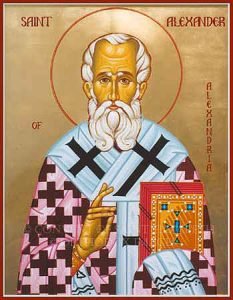In this article I have tried to express the thoughts of the Greek Fathers of the Church and, in doing so, I have, of course, mentioned the struggles that the Church encountered during the first seven/eight centuries. The struggles were namely about Who Jesus Is. I’ve mentioned in passing several heresies, and thought that I would now look at them in a little more depth. The first, of course, being the ARIAN CONTROVERSY.
While for years the Church had reflected fruitfully on the person and work of Christ, it took a specific individual to prod the Church to formalize or crystallize its teaching regarding the divinity of Jesus. How sad?  At Alexandria in the early fourth century, a priest by the name of Arius began to question seriously the possibility that Jesus could be divine, at least in the same sense that God or the Father was divine.
At Alexandria in the early fourth century, a priest by the name of Arius began to question seriously the possibility that Jesus could be divine, at least in the same sense that God or the Father was divine.
We can best understand Arius’ position by sneaking a peek at his own mail. In a letter written to his friend Eusebius of Nicomedia, Arius complains of the trouble that has engulfed him in Alexandria. Arius relates that “the bishop greatly injures and persecutes us and does all he can against us, trying to drive us out of the city as godless men.” Why was Arius encountering such opposition?
Arius writes that
we do not agree with him [Alexander, the bishop of Alexandria] when he says publically, “Always Father, always Son,” “Father and Son together,” “The Son exists unbegottenly with God,” “The eternal begotten”, “Unbegotten-only-one”, “Neither in thought nor by a single instant is God before the Son,” Always God, always son,” “The son is of God Himself.”
Arius is displeased with Bishop Alexander’s description of the Son, largely because Alexander is leaning over backwards in his insistence that the son has always been with the Father. There is “no instant,” as Alexander phrases it, when the Father was without the Son. Indeed, to be Father is to have a Son: “always God always Son.” If so the son must be divine in essence, just as the Father is. Or so it would seem.
Arius refused to accept Alexander’s formulations. Alexander’s position raises a number of problems that appear insurmountable to Arius. Thus the beginning of the heresy of Arius. More to follow
